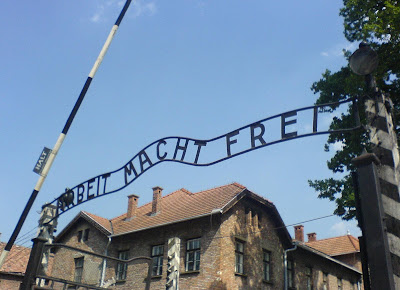
The entry gate to Auschwitz concentration camp, taken in July 2006. The infamous "ARBEIT MACHT FREI" message is visible.
The Auschwitz sign was stolen in the early morning of December 18, 2009. It is the first time the sign (made by Polish prisoners) has been stolen since it was erected in the early 1940s. The sign was orginally erected by the Nazis after the Auschwitz barracks were converted into a labour camp to house Polish resistance fighters in 1940. A police spokeswoman said the 5-metre (16 ft), 41-kilogram (90 lb) wrought iron sign was unscrewed on one side and torn off on the other. The missing sign was replaced by a replica, which had been created some years earlier as a temporary replacement while the original was being restored.
Such was the concern about its theft that Poland declared a state of emergency. It was found by the police, cut into three parts, in northern Poland two days later in the home of one of five men who were arrested. An unnamed overseas buyer is believed to have been involved.
The Aftonbladet newspaper (a Swedish tabloid) reported that the sign had been stolen by Polish thieves paid by and working on behalf of a Swedish right-wing extremist group hoping to use proceeds from the proposed sale of the sign to a collector of Nazi memorabilia, to finance a series of terror attacks aimed at influencing voters in upcoming Swedish Parliamentary elections.
The original sign will be welded back together and put back up after an improved security system is put in place.
"Arbeit macht frei" is a German phrase with the word-for-word meaning of "work makes free", which can be translated as "work liberates". The slogan is well-known for being placed at the entrances to a number of Nazi concentration camps.
The slogan can still be seen at several sites, including over the entrance to Auschwitz I. The sign was placed there by commandant Rudolf Höss (First commandant of Auschwitz concentration camp). Höss believed that doing menial work during his own imprisonment under the Weimar Republic helped him through the experience.
It was said by The Ethical Spectacle about Höss:
He seems not to have intended it as a mockery, nor even to have intended it literally, as a false promise that those who worked to exhaustion would eventually be released, but rather as a kind of mystical declaration that self-sacrifice in the form of endless labor does in itself bring a kind of spiritual freedom.
Source: Wikipedia (All text is available under the terms of the GNU Free Documentation License)
"Arbeit macht frei" is a German phrase with the word-for-word meaning of "work makes free", which can be translated as "work liberates". The slogan is well-known for being placed at the entrances to a number of Nazi concentration camps.
The slogan can still be seen at several sites, including over the entrance to Auschwitz I. The sign was placed there by commandant Rudolf Höss (First commandant of Auschwitz concentration camp). Höss believed that doing menial work during his own imprisonment under the Weimar Republic helped him through the experience.
It was said by The Ethical Spectacle about Höss:
He seems not to have intended it as a mockery, nor even to have intended it literally, as a false promise that those who worked to exhaustion would eventually be released, but rather as a kind of mystical declaration that self-sacrifice in the form of endless labor does in itself bring a kind of spiritual freedom.
Source: Wikipedia (All text is available under the terms of the GNU Free Documentation License)